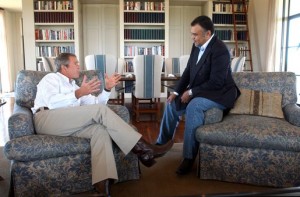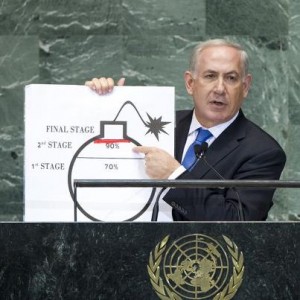Trump
Lets Saudis Off His ‘Muslim Ban’
By
leaving Saudi Arabia and other key terrorism sponsors off his “Muslim
ban,” President Trump shows the same cowardice and dishonesty that
infected the Bush and Obama administrations, writes Robert Parry.
By
Robert Parry
January
29, 2017
President
Trump’s ban against letting people from seven mostly Muslim
countries enter the United States looks to many like a thinly
concealed bias against a religion, but it also is a troubling sign
that Trump doesn’t have the nerve to challenge the false terrorism
narrative demanded by Israel and Saudi Arabia.
King
Salman of Saudi Arabia and his entourage arrive to greet President
Barack Obama and First Lady Michelle Obama at King Khalid
International Airport in Riyadh, Saudi Arabia, Jan. 27, 2015.
(Official White House Photo by Pete Souza)
The
Israeli-Saudi narrative, which is repeated endlessly inside Official
Washington, is that Iran is the principal sponsor of terrorism when
that dubious honor clearly falls to Saudi Arabia, Qatar and other
Sunni-led Muslim states, including Pakistan, nations that did not
make Trump’s list.
The
evidence of who is funding and supporting most of the world’s
terrorism is overwhelming. All major terrorist groups that have
bedeviled the United States and the West over the past couple of
decades – from Al Qaeda to the Taliban to Islamic State – can
trace their roots back to Sunni-led countries, particularly Saudi
Arabia, Pakistan and Qatar.
Privately,
this reality has been recognized by senior U.S. officials, including
former Vice President Joe Biden, former Secretary of State Hillary
Clinton and Trump’s National Security Advisor Michael Flynn. But
that knowledge has failed to change U.S. policy, which caters to the
oil-rich Saudis and the politically powerful Israelis.
For
instance, in August 2012, the U.S. Defense Intelligence Agency –
then headed by General Flynn – warned that
Salafists, the Muslim Brotherhood, and Al Qaeda were “the major
forces driving the insurgency” against the largely secular
government in Syria.
Flynn’s
DIA advised President Obama that rebels were trying to establish a
“Salafist principality in eastern Syria,” and that “western
countries, the gulf states, and Turkey are supporting these efforts”
to counter the supposed Shiite threat to the region.
Hillary
Clinton also was aware of this reality, as the threat from the
head-chopping Islamic State – also known as ISIL or ISIS – grew
worse in summer 2014. In September 2014, the former Secretary of
State wrote in
an email that Saudi Arabia and Qatar were “providing clandestine
financial and logistic support to ISIL and other radical Sunni
groups.”
Later
in 2014, Vice President Joe Biden made the same point in a talk at
Harvard’s Kennedy School: “Our allies in the region were our
largest problem in Syria … the Saudis, the emirates, etc. what were
they doing? They were so determined to take down Assad and
essentially have a proxy Sunni-Shia war, what did they do? They
poured hundreds of millions of dollars and tens of thousands of tons
of military weapons into anyone who would fight against Assad, except
the people who were being supplied were Al Nusra and Al Qaeda and the
extremist elements of jihadis coming from other parts of the world.”
[Quote starts
at 53:25.]
Known
But Unknown
So
the truth was known at senior levels of the Obama administration –
and now via National Security Advisor Flynn at the top of the Trump
administration – but the Israelis and the Saudis don’t want that
reality to shape U.S. foreign policy. In other words, this truth
about the real source of terrorism was known but unknown.
Retired
U.S. Army Lieutenant General Michael Flynn at a campaign rally for
Donald Trump at the Phoenix Convention Center in Phoenix, Arizona.
Oct. 29, 2016. (Flickr Gage Skidmore)
Instead,
Israel demands that Washington share its hatred of the Lebanese
militant group, Hezbollah, a Shiite force that organized in the 1980s
to drive the invading Israeli army out of southern Lebanon. Because
Hezbollah dealt a rare defeat to the Israeli Defense Force, Israel
puts it at the top of “terrorist” organizations. And, Hezbollah
is supported by Iran.
Saudi
Arabia, too, hates Iran because the Sunni-fundamentalist Saudi
monarchy considers Shia Islam heretical, a sectarian conflict that
dates back to the Seventh Century. So, the Saudi government has
viewed Sunni jihadists as the tip of the spear against these Shiite
rivals.
Israeli
and Saudi officials have even made clear that they would prefer Al
Qaeda or Islamic State to prevail in the Syrian war rather than have
the largely secular government of President Bashar al-Assad survive
because they see his regime as part of a “Shiite crescent”
reaching from Tehran through Damascus to the Hezbollah neighborhoods
of Beirut.
In
September 2013, Israel’s Ambassador to the United States
Michael Oren, a close adviser to Israeli Prime Minister Benjamin
Netanyahu, told the Jerusalem Post that Israel favored the
Sunni extremists over Assad.
“The
greatest danger to Israel is by the strategic arc that extends from
Tehran, to Damascus to Beirut. And we saw the Assad regime as the
keystone in that arc,” Oren said in the
interview.
“We always wanted Bashar Assad to go, we always preferred the bad
guys who weren’t backed by Iran to the bad guys who were backed by
Iran.” He said this was the case even if the “bad guys”
were affiliated with Al Qaeda.
And,
in June 2014, speaking as a former ambassador at an Aspen Institute
conference, Oren expanded on his position, saying Israel
would even prefer a victory by the brutal Islamic State over
continuation of the Iranian-backed Assad in Syria. “From Israel’s
perspective, if there’s got to be an evil that’s got to prevail,
let the Sunni evil prevail,” Oren said.
The
West’s Worries
However,
when Americans and Europeans worry about terrorism, they are talking
about Al Qaeda and Islamic State, terror groups led by Sunni
extremists. Those are the groups that have been responsible for
bloody attacks on the United States and Western Europe.
Prince
Bandar bin Sultan, then Saudi ambassador to the United States,
meeting with President George W. Bush in Crawford, Texas, on Aug.
27, 2002. (White House photo)
The
absurdity of Trump’s immigration ban is underscored by the fact
that it would not have kept out the 15 Saudi hijackers dispatched by
Al Qaeda to carry out the 9/11 attacks. They came from the home
country of Al Qaeda’s Saudi founder Osama bin Laden.
Neither
would Trump’s ban have stopped Muhamed Atta, one of the 9/11
ringleaders who was from Egypt, another country ignored by Trump,
which also happens to be the original home of Ayman al-Zawahiri, Al
Qaeda’s current leader.
So,
what Trump’s initial foray into the complex issue of terrorism has
revealed is that he is unwilling to take on the real nexus of
terrorism, just as Presidents George W. Bush and Barack Obama shied
away from a clash with Israel, Saudi Arabia and the Gulf sheikdoms.
In
the first week of Donald Trump’s presidency, the regional interests
of Israel and Saudi Arabia have continued to dictate how Official
Washington addresses terrorism.
Trump’s
seven-nation list includes Iran, Syria and Sudan as state sponsors of
terrorism and Iraq, Yemen, Somalia and Libya as countries where there
has been terrorist activity. But the governments of Iran and Syria
arguably have become two of the leading fighters against the
terrorist groups of most concern to the U.S. and European
populations.
Iran
is aiding both Syria and Iraq in their conflicts with Al Qaeda and
Islamic State. Inside Syria, the Syrian army has borne the brunt of
that fighting against terror groups funded and armed by Saudi Arabia,
Qatar, Turkey, and – yes – at least indirectly, the United
States. Yet while none of the Al Qaeda/Islamic State benefactors made
Trump’s list, Iran and Syria did.
In
other words, not only is Trump’s ban a blunderbuss blast at
thousands of innocent Muslims who have no intention of hurting the
United States but it doesn’t even take aim at the most dangerous
targets which represent a genuine terrorist threat.
Trump’s
ban is really a twisted case of “political correctness”
purporting to reject “political correctness.” While Trump claims
to recognize that it is dangerously naïve to let in Muslims when
Islamic terrorism has remained a threat to Americans, Trump has left
off his list the most likely sources of terrorists because – to do
otherwise – would have negative political consequences in Official
Washington.
By
going after Iran and Syria, in particular, Trump appears to be
currying favor with neoconservatives and liberal hawks in Congress
and across Official Washington. Perhaps, he is simply hesitating
while the Senate considers confirmation of his choice for Secretary
of State, Rex Tillerson. The Senate also could reject other of his
foreign policy nominees.
But
that is exactly the kind of compromising that undermined any attempts
by President Obama to engineer a real change from the “war of
terror” strategy of George W. Bush. Obama was so afraid of going
against the Israelis and the Saudis that he only altered U.S. policy
on the margins and let himself get dragged into Israeli-Saudi-favored
“regime change” adventures in Syria and Yemen.
Dashed
or Delayed Hopes
When
Trump initially rebuffed the neocons and liberal hawks who dominate
Official Washington’s foreign establishment, there was hope that he
might at least try to hold Saudi Arabia accountable as the chief
sponsor of terrorism, rather than to continue the
Israeli-Saudi-imposed narrative.
Israeli
Prime Minister Benjamin Netanyahu at the United Nations in 2012,
drawing his own “red line” on how far he will let Iran go in
refining nuclear fuel.
But
to do so carried political risks beyond offending the politically
potent Israelis who have forged a quiet alliance with the wealthy
Saudis. Trump would also have to recognize the important role of
Republican icon Ronald Reagan in creating the terrorist threat.
After
all, the origins of the modern jihadist movement trace back to the $1
billion-a-year collaboration between the Reagan administration and
the Saudi monarchy to support the Afghan mujahedeen in their war
against a secular government in Kabul backed by the Soviet Union.
The
extravagant arming of these Afghan fundamentalists, who were
bolstered by international jihadists led by Osama bin Laden, dealt a
harsh blow to the Soviet forces and ultimately led to the collapse of
the secular regime in Kabul, but the victory also paved the way for
the rise of the Taliban and Al Qaeda, blowback that hit the United
States on 9/11.
The
U.S. reaction to that shock never directly addressed how the problem
had originated and who the underlying culprits were. Though George W.
Bush’s administration did begin by invading Afghanistan, the
neoconservatives around him quickly turned the U.S. retaliation
against longstanding Israeli targets, such as Iraq’s Saddam Hussein
and Syria’s Assad dynasty though they had nothing to do with 9/11.
The
fiction that these largely secular governments were responsible for
Islamic terrorism — and the mislabeling of Shia-ruled Iran as the
chief sponsor of such terrorism — have remained the myths confusing
the American people and thus justifying continued U.S. support for
the Israeli-Saudi war against the “Shiite crescent.”
Trump,
who is heavily criticized for his inability to distinguish fact from
fantasy, could have displayed a brave commitment to truth-telling if
he had fashioned his counter-terrorism policy to actually address the
real sponsors of terrorism. Instead, he chose to continue the lies
that the Israelis and Saudis insist that Official Washington tell.
In
doing so, Trump is not only offending much of the world and
alienating countries that are at the forefront of the fight against
the worst terrorist threats, but he is continuing to shield the key
regimes that have perpetuated the scourge of terrorism.
Investigative
reporter Robert Parry broke many of the Iran-Contra stories for The
Associated Press and Newsweek in the 1980s. You can buy his latest
book, America’s
Stolen Narrative, either
in print
here or
as an e-book (from Amazon andbarnesandnoble.com).


















